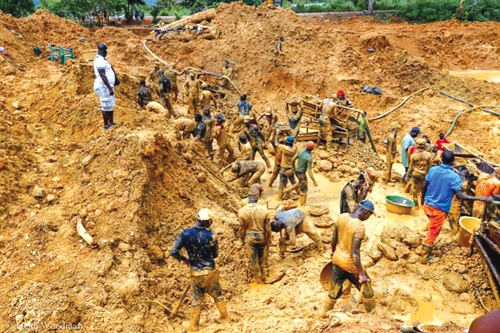
Are we going to win the fight against galamsey?
The pressing question remains: “If galamsey is illegal in Ghana, why have successive governments struggled to enforce the law, despite having substantial resources at their disposal?”
Galamsey, a term used to describe illegal small-scale mining, poses a severe threat to Ghana's environment.
It wreaks havoc on water bodies, forests, farmlands and even the nation's critical cocoa sector.
The ramifications extend beyond environmental degradation, inflicting significant socio-economic damage that undermines the country's efforts toward sustainable development.
Despite its illegality, the endurance of galamsey unveils a troubling reality: ineffective enforcement is not solely attributable to logistical constraints but is deeply rooted in various forms of government complicity.
Both the New Patriotic Party (NPP) and the National Democratic Congress (NDC) have faced intense scrutiny for their inability to address this pervasive issue.
This article explores the intricate interplay of political and institutional involvement in perpetuating galamsey and proposes practical measures to address the problem.
Political expediency
One primary reason for the persistence of galamsey is political patronage, which often incentivises and protects illegal mining operations.
Political figures from both the NPP and NDC have, at different times, either overlooked or actively endorsed galamsey activities allegedly in exchange for electoral gain.
In many mining communities, illegal miners constitute a vital voting bloc, making it politically precarious for governments to impose stringent anti-galamsey measures.
During President John Mahama's first term (2012–2016), reports surfaced indicating that certain government officials shielded illegal miners from prosecution.
Similarly, under President Nana Akufo-Addo's administration (2017-2024), allegations arose implicating regional and district officials in facilitating or ignoring illegal mining, despite the government's public condemnation of such activities.
These instances illustrate a troubling trend where political expediency frequently trumps environmental and legal considerations.
Closely associated with political patronage is the prevalence of corruption within regulatory and law enforcement agencies.
Numerous officials tasked with enforcing mining regulations have been compromised by bribery.
Investigative journalist Anas Aremeyaw Anas has uncovered cases where law enforcement personnel accepted bribes in exchange for allowing illegal mining operations to proceed.
One notable case involved Charles Bissue, a former secretary of the Inter-Ministerial Committee on Illegal Mining (IMCIM), who was caught in an undercover investigation allegedly accepting bribes to enable illegal activities.
Such instances underscore how even high-ranking officials can obstruct efforts to combat galamsey, thereby perpetuating its existence.
Another significant challenge is the inconsistent enforcement of existing laws and the perceived complicity within the judiciary.
Despite a robust legal framework against illegal mining, enforcement remains sporadic.
Arrested illegal miners, including foreign nationals, are frequently released under unclear or questionable circumstances.
The case of Aisha Huang, infamously dubbed the “galamsey queen,” serves as a striking example.
After being arrested and deported during the NPP administration, she allegedly re-entered the country and resumed her illegal activities.
This incident raises profound concerns about the efficacy of law enforcement and the integrity of the judicial and immigration systems.
Moreover, it reinforces the perception that certain individuals enjoy preferential treatment due to their wealth or influence.
Solutions
To tackle galamsey successfully, Ghana must strengthen its institutional frameworks while enhancing transparency and accountability.
A crucial first step is to ensure that regulatory agencies such as the Minerals Commission and the Environmental Protection Agency operate free from political interference and are subjected to rigorous oversight.
Empowering independent anti-corruption institutions, such as the Office of the Special Prosecutor, to investigate and prosecute cases of official complicity is essential. These bodies must be adequately resourced and granted the authority to function devoid of political pressure.
For greater transparency in the issuing of mining licences, a decentralised system is recommended.
The government should also establish a publicly available digital platform for tracking all small-scale mining licences and permissions.
Such a system would deter improper practices and facilitate increased public scrutiny.
Moreover, effective oversight is essential to ensure that individuals and organisations with permits do not operate outside their allocated zones.
Moreover, the government must invest in sustainable livelihood programmes for communities dependent on illegal mining for their survival.
Initiatives could include support for legal small-scale mining cooperatives, vocational training and the promotion of environmentally friendly enterprises such as agriculture and ecotourism.
By creating viable economic alternatives, the state can reduce the reliance on illegal mining and foster a healthier environment for future generations.
Conclusion
In conclusion, the fight against galamsey in Ghana necessitates a multifaceted approach that addresses the underlying political, institutional and social factors perpetuating this illegal activity. Strengthening governance structures, enhancing transparency and investing in community livelihoods are critical steps towards a sustainable future.
Only through collective effort and unwavering commitment can Ghana hope to win the battle against galamsey and protect its natural resources for generations to come.
By prioritising the well-being of the nation over short-term political gains, Ghana can pave the way for a greener and more sustainable future.
In the end, it is not merely about enforcing laws; it is about fostering a culture of accountability and empowering communities towards sustainable development free from the shackles of illegal mining.
The writer is a Political Scientist
